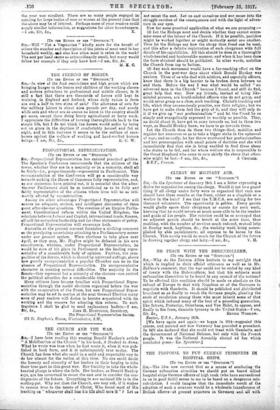PROPORTIONAL REPRESENTATION. (To THE EDITOR CP TEE "SPECTATOR."] m, Proportional
Representation has entered practical politico. The Speaker's Conference recommends that the citizens of the towns, whether they are in a majority or in a minority, shall all he fairly—i.e., proportionately—represented in Parliament. This recommendation of the Conference will go a considerable way towards making the House of Commons fully representative, and, as our statesmen have pointed out, it is essential that the after- the-war Parliament shall be so constituted as to be fully and fairly representative of the citizens whose lives will be so inti- mately affected by reconstruction.
Among its other advantages Proportional Representation will ensure an adequate, serious, and intelligent discussion of those great after-the-war questions. The creation of an Empire Parlia- ment, Constitutional reform within the United Kingdom, the relations between Labour and Capital, international trade, finance, all call for outspoken leadership and for clear statements of policy. Proportional Representation will encourage both.
Australia at the present moment furnishes a striking comment en the paralysing uncertainty attaching to a Parliamentary career under our present system. Were elections to take place next April, as they may, Mr. Hughes might be defeated in his own constituency, whereas, under Proportional Representation, he would be sure of his place in Parliament as the leading repre- sentative of a considerable body of opinion. Further, the com- position of the Senate, which is elected by universal suffrage, shows how grossly unrepresentative a popular Chamber can be in the absence of Proportional Representation. Its unrepresentative eharecter is creating serious difficulties. The majority in the Senate—they represent but a minority of the electors—can control the political situation for a considerable time.
Many citizens have become familiar with Proportional Repre- mntation through the model elections organized before the war with the co-operation of the Press, but now Proportional Repre- sentation may be set in motion at the next General Election many more of your readers will desire to become acquainted with its working and the reasons for adopting this reform. To such inquirers I shall be glad to send explanatory leaflets.—I am, Sir, &e., Jones H. linurmars, Secretary, • The Proportional Representation Society. 179 St. Stephen's House, Westminster, S.TV,


































 Previous page
Previous page